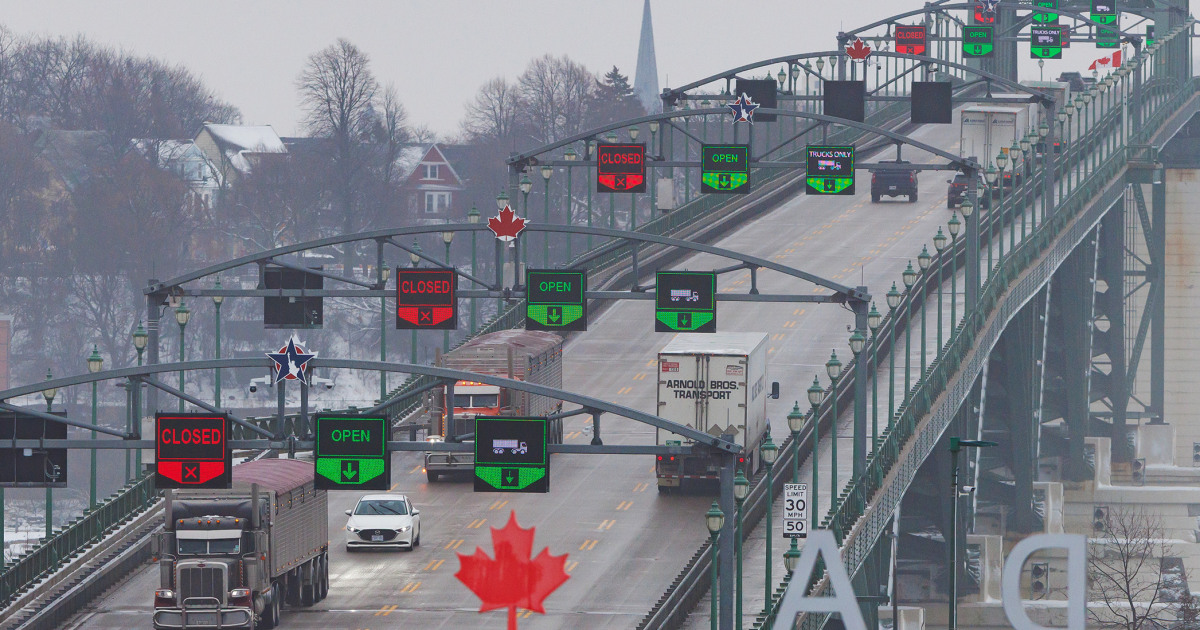Some Canadians have begun boycotting American products and booing the U.S. national anthem at professional sporting events in protest of President Donald Trump’s looming tariffs.
“I’m pissed off,” said Pierre Oliver, one of the many frustrated residents of the U.S. ally nation heeding Prime Minister Justin Trudeau’s call on Sunday to prioritize buying Canadian goods in retaliation to Trump’s executive order that imposes tariffs on Canada, Mexico and China.
“It’s a drop in the bucket,” Oliver, a 67-year-old Ontario business owner, added. “But it’s the only thing we can do.”
Trump on Saturday announced a 25% tariff on imports from Mexico and Canada — excluding Canadian energy products, which would face a 10% tariff. He also implemented a 10% tariff on imports from China, citing the role all three countries have played in the flow of fentanyl and undocumented immigrants to the United States.
On Monday, Trump announced that the tariffs he had planned to implement for Mexican products will be on pause for a month after Mexican President Claudia Sheinbaum agreed to send 10,000 soldiers to the U.S.-Mexico border to address concerns about drugs.
The U.S. tariffs on Canada were set to take effect Tuesday. But Trudeau also announced Monday that the proposed tariffs against Canada would be paused for at least 30 days while Canada and the U.S. “work together.” He said Canada would also address fentanyl and border issues after having a “good call” with Trump.
Before the pause, Trudeau said Canada would take retaliatory action by imposing a 25% tariff on about $106 billion worth of U.S. goods.
Tim Houston, the Premier of Nova Scotia, said officials would direct the Nova Scotia Liquor Corporation to remove all alcohol from the U.S. from their shelves starting Tuesday.
Trudeau and Wab Kinew, the premier of Manitoba, also urged Canadians to buy homemade goods.
“Now is the time to choose products made right here in Canada,” Trudeau posted on social media platforms. “Check the labels. Let’s do our part. Wherever we can, choose Canada.”
Kinew said shopping local was a way to “fight back.” “Where you spend your money—those are some of the most important decisions that you make,” Kinew wrote on social media.
In at least one major Facebook group, which was created years ago to promote Canadian products and has more than 577,000 members, some shared suggestions on Canadian alternatives to popular American brands, including Kraft, Dawn, Lysol, Campbell’s and Starbucks. Others proudly shared photos of their grocery hauls containing zero U.S. goods.
“My first shopping trip with my new ‘buy no US mandate,’’ one social media user wrote.
At a Loblaws City Market, another social media user said he spotted “Made in British Columbia” labels in aisles indicating which goods were produced at home. The Canadian supermarket chain did not immediately confirm Monday whether the labels were a response to the tariffs.
The visceral opposition to the tariffs was apparent over the weekend, when some Canadian sports fans booed performances of The Star-Spangled Banner during the Toronto Raptors basketball game and the NHL’s Canucks game held in Canadian, according to the The Associated Press.
For Oliver, the outraged business owner who is part of the boycott, the tariffs have struck a personal chord.
He said his grandfather, a former officer in the Royal Canadian Navy, helped put American troops on Omaha Beach in Normandy, France, where Allied forces landed in 1944 during World War II’s D-Day invasion.
“This is not the world that my grandfather put his life on the line for,” Oliver said.
Meanwhile, Oliver, who has been manufacturing high-end model train kits for more than a dozen years, said he’s bracing for the worst.
“The threatened tariff, it stands a chance at ending my business,” he said.
About 95% of his sales come from the United States, Oliver said, adding that he might have to increase the cost of his kits that currently sell for $65.
“Everybody’s got a tipping point,” he said. “A significant jump in the cost to the consumer could be enough for the consumer to say, ‘I’m not prepared to pay that kind of money at that point.’”
Since Oliver also relies on some American-made raw materials to make his products, he said he would also feel the effects of the tariffs on both ends.
“It’s all inflationary pressure across the board,” he said. “This is a massive betrayal of a legacy that goes back over a century.”

